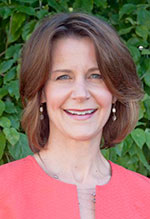Foundation offers ways for people from all walks of life to give
Criterion staff report
 As the archdiocese’s Catholic Community Foundation (CCF) wrapped up its annual meeting on Oct. 30 (see related story), The Criterion spoke with Ellen Brunner, the foundation’s director, to learn more about what CCF is, what it does and how to participate.
As the archdiocese’s Catholic Community Foundation (CCF) wrapped up its annual meeting on Oct. 30 (see related story), The Criterion spoke with Ellen Brunner, the foundation’s director, to learn more about what CCF is, what it does and how to participate.
Here is an edited transcript of that interview.
Q. What is the Catholic Community Foundation?
A. “It’s like a savings account for our archdiocese. Anyone who operates a household budget understands you’ve got to have resources to keep the lights on and pay the heating bill.
“But you also need to be planning for those times when you may need a little more. I see the CCF as providing that safeguard. Like personal savings, you set those funds aside.
“People can donate through wills, charitable trusts and other ways, like endowments—which are perpetual—or donor-advised funds—which may not be perpetual, like a checking account.
“It’s a nice addition to work that’s done on an annual basis. What a great resource for people who want to remember their Church and loved ones.”
Q. Do only the wealthy participate in the Catholic Community Foundation?
A. “Definitely not. I work with all ages, a mixed bag in terms of demographics and resources they’re available to give.
“Planned giving and charitable giving is a mindset. To be philanthropic is not just for the wealthy. The people I work with are faith-filled and passionate about the works of the Church.
“For instance, with a will you can say, ‘I want X percent to go to the Church’ rather than specifying a certain amount. I think it’s good to talk of percentage. That makes philanthropy reachable for all of us, not just the wealthy.
“The minimum to start an endowment or donor-advised fund is $5,000, but we can work with individuals or ministries over time to get to that level. It’s just like when you set aside money for a saving account. Rarely do you start with the end goal amount. You say, ‘I’m going to set aside some a month until I reach $5,000.’
“You can also look at the existing funds and donate. You can mail a check, or do a direct deposit, or make a monthly contribution—there are all kinds of things you can look at doing.”
Q. How varied are the choices of the existing funds and endowments?
A. “With 437 existing endowments and funds, the list is pretty varied, from CYO to Our Lady of Fatima Retreat House to Catholic Charities. Almost every parish and school has a fund. Some are missing, and we encourage people to make sure their parish and school are represented. Some funds are set up for ministries that are a single representation of a certain work. There are a number of funds that are named for people.
“If you think about the three-fold mission of vocations, Catholic education and charitable outreach, those funds are all strongly represented. But we still have stones unturned.”
Q. Where do people start if they’re interested in setting up a fund under the CCF umbrella?
A. “We help people get where they want to go but are afraid to take that journey. When you get to that fork in the road about where and how to donate, which way do you go, we serve as a resource. We say, ‘Let’s talk about what’s been important to you.’ All of a sudden, there’s a lot of clarity.
“As a resource for suggestions, I understand that there are other good charities out there, and I want people to give where they’re passionate. It’s all about making people comfortable.”
Q. You refer to CCF as a resource for offering suggestions. How so?
A. “We do consulting to parishes, schools, individuals and ministries to encourage legacy planning. No matter how much they have to work with, we talk about what’s the best way to do that, planning strategies, and they’re not always complex.
“We share our knowledge and talk about what is the best way for them to donate, like a bond, a will, a give collection, an endowment, a donor-advised fund and so on. They can then talk it through with their tax advisor and financial advisor to see what’s best.
“Plus we keep in mind the teachings of the Church, and make sure the assets are aligned with those teachings.” †
 As the archdiocese’s Catholic Community Foundation (CCF) wrapped up its annual meeting on Oct. 30 (
As the archdiocese’s Catholic Community Foundation (CCF) wrapped up its annual meeting on Oct. 30 (